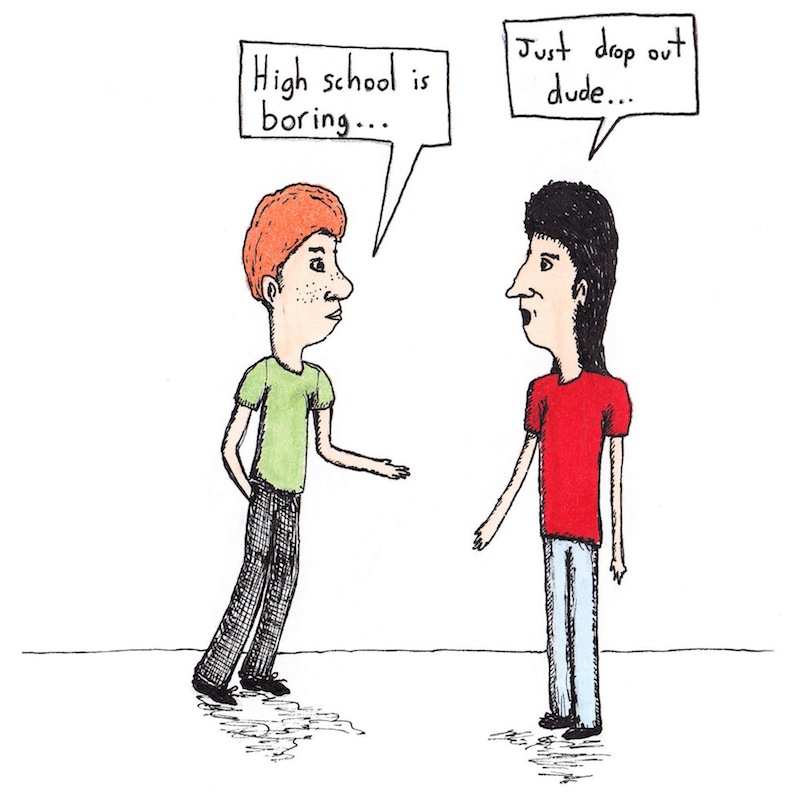
We hold rallies aimed at improving test scores and festivals that celebrate good grades. You never hear about gangster violence or fights erupting in the middle of the quad. Even the common drug-sniffing “safety checks” unearth little to nothing.
In essence we are a bubble within a bubble; the inner bubble being Foothill and the outer bubble being Ventura. We are constantly shielded from the adversities of the world, one of them being the high rate of teenagers who drop out of high school.
To the best of my knowledge, I cannot think of a single person who will not graduate in my senior class. Sure, people have left Foothill because of academic conflicts, but even then they went on to attend another school.
Proof of Foothill’s academic “exceptionalism” can be seen in my Advanced Placement Literature class, where the entire back wall is covered in a blanket of white butcher paper. On this paper are the names of students with a list of the schools they were accepted to underneath. The more days pass, the less space there is on the wall. However, the deficit of space is made up by a surplus of impressive college names.
Looking at this wall, I cannot help but feel a sense of joy that my fellow peers are going off to obtain a higher degree of education and, hopefully, a higher quality of life. However, at the same time the fact that over one million students drop out on an annual basis fills me with anger.
I think of all the raw skill and talent which will never be refined and put to use. I think of all of the high school dropouts who are practically destined to live the remainder of their lives working in a labor-intensive environment. More infuriating is the fact that while people in our country pass up the opportunity to grow intellectually, there are others abroad that would do anything to achieve even a basic level of literacy; to learn how to write and read their name on paper.
As we speak, the only real incentives to finishing high school are (A) making your parents proud and (B) the possibility of going on to obtain a higher degree of education. To many, those two things are fulfilling enough. However, for countless others these two things are little to no motivation. So in order to prevent millions of teens from dropping out, I propose replacing the incentive with a threat: finish high school or impose a tax on drop outs.
Tax dropouts for every free meal they were given. Tax students for the amount of money the government paid for their teachers, textbooks, for the upkeep of their schools, and, if applicable, the summer school that was of no use. Tax them for every opportunity that was handed down to them, but never used to complete fulfillment.
The United States currently spends more than $800 billion dollars a year on education. In our current state of economic disparity, no penny should be wasted. The government ought to make it a priority to collect money from individuals who misused the “free” service given to them.
Think about it, we currently tax people for working hard and generating a huge income, so why shouldn’t we tax those who wasted the tax payers’ money? Sure, it’s harsh, but from an economic point of view it can make complete sense.
Approximately 85.3 percent of people within the United States have a high school degree or better. Let’s assume that the remaining 14.7 percent, or 45,804,012 people in America, all dropped out. Hypothetically, if you spent $100,000 on each individual, taxing them the full amount spent would generate over $4.5 trillion (about one-fourth of what our entire country makes in a year). Money which could be spent on aiding impoverished neighborhoods, health care, aiding students through undergraduate/graduate school, and funding activities in areas such as: art, math, literature, and science.
Think about it, the money from this tax alone could be spent on giving Americans the skills, talents, and education needed compete on the global market against countries such as China, India, and the United Kingdom. Better yet, it could be spent on helping a grandmother pay for a much needed operation or rebuilding a city like Detroit.
For those students who could not pay the tax, pass the tax to the dropouts’ families. Perhaps then parents and families will have an incentive to devote a bit more time to their children and motivate them to finish school.
As with every tax, there are bound to be people who are exceptions. Some people postpone high school because they have to find employment in order to receive financial aid their families. Others, either by accident or planning, have to devote their time to raising a child. For individuals with legitimate reasons, the tax should be withheld. However, for the rest, the full weight of the Internal Revenue Service should be brought down upon them.
I realize that by its very nature this tax is aimed at the poor and minorities. People of African American and Hispanic descent far outnumber the amount of Caucasians when it comes to the number of students who drop out of high school. Coincidently, these minorities tend to live in impoverished communities. However, I strongly believe that this is the type of motivation that the poor and minorities need.
I wasn’t born in a palace, my household was not necessarily stable, and I did not come from a family who had experience with graduating from high school or college. But even with all these obstacles, I was able to break through socio-economic barriers and persevere in my endeavor to complete my high school education and move on to attend college. Hopefully this tax will motivate others to do the same or at least complete the bare minimum.








